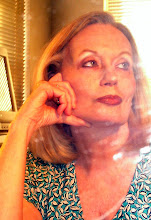Actually, I started my writing career as a poet, and at quite a young age. Poetry suited me then. Like a lot of young people my conclusions about the world were hazy, most of my knowledge came straight out of contemporary fiction, and my emotions were large and unmanageable. Since I couldn't make much sense of direct experiences, I grabbed at metaphors quite naturally and my fast hot blasts of emotion were ideally suited to lyric poetry's tiny forms.
Back then, my fiction writing was entirely private and I entered into it like a warm bath: usually aching and half-aware. Large, undigested lumps of pain were what sent me scurrying to the typewriter: my father's very early death, my bleak then-marriage, or my long soggy clinical depression. Weirdly, or so it seems to me now, I could only hammer out my stories when I was completely alone in our student-rat apartment. They were done in single night-long bouts, as though I was afraid I wouldn't live to see the next day, and had to finish them instantly, right then. Once I was done writing, I'd read my story with real bewilderment. Why on earth did I say that? I'd wonder. And I'd wonder if what I'd written was even a real story at all, or just an outpouring of childish misery. Then I'd put my manuscript away in a black binder, and forget it utterly. But early on in my fiction writing, once I was done with a story, I realized that this thing, the black beast haunting me, had been magically erased, never to return growling and slavering at my door.
And so I formed the idea, never shared or articulated, that stories could heal me. At the time, and for many years after, I didn't think about that, was happy just to know it and keep on writing, squirreling my typescripts away, content to let them be My Own Private Idaho. Much, much later, when events tossed me into a 12 Step Group, I realized that the bulk of our meetings had to do with telling stories, very focused and pointed stories. And, simultaneously, I became aware that people got well in this place. Then suddenly, I was getting well too, and I began to write fiction for the outside world.
Why do stories have this power? Unless they're naturally good at it, I've discovered most people don't tell stories. They may talk about events, with one occurrence sliding into the next, with no beginning and no end. But that's not story-telling. Once upon a time and The End mark the boundaries of fiction's country. Selecting and arranging the landmarks for that particular land means we have to think about our experience deeply, look closely at what first seemed irrelevant, and pay attention to the travelers who crossed our path. It's this profound attention, I think, that cauterizes our bleeding selves, lets our bones knit, and opens us to life once more.
To my rightfully skeptical reader: the next time you lie awake hating yourself, or someone else, or are just tossing wretchedly, burdened with a foggy sense of discontent, tell a story. Tell yourself a story about whatever has happened, beginning with those most magical words: Once upon a time. When you come to, The End see if your problems and sorrows haven't shrunk or even vanished. Just try it.
Friday, March 14, 2008
Subscribe to:
Post Comments (Atom)




2 comments:
Very nice. A gentleness to the voice that is pleasing. Too, it helps ease the pain of no blog postings for the past 2 days.
That's powerful--like poetry. :-)
Mike E.
Post a Comment